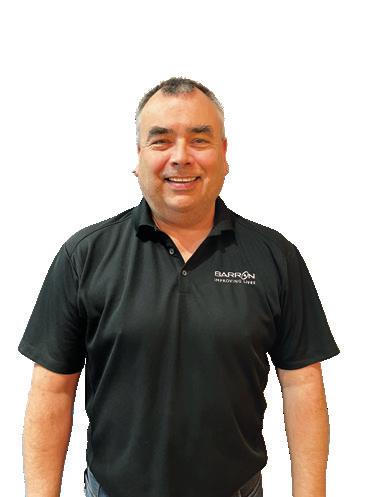SEP/OCT 2024


SEP/OCT 2024

Chief Rebecca Mertzig tackles issues close to home.

Candidates share their position on key issues before the November election; HII land threatened; celebrating local business, and more!



Your local business news brought to you by
VOL. 49 | NO. 5
PUBLISHER
EXECUTIVE DIRECTOR CONTRIBUTING WRITERS




GUEST COLUMNISTS
ART DIRECTOR PHOTOGRAPHY COPY EDITOR
WBA BOARD OF DIRECTORS:
BOARD CHAIR: Josh Wright, Partner, Acrisure
EXECUTIVE COMMITTEE: Pam Brady, Director NW Gov’t & Public Affairs, bp Cherry Point; John Huntley, President/CEO, Mills Electric Inc.; Doug Thomas, President/CEO, Bellingham Cold Storage; Josh Turrell, Partner, Larson Gross PLLC





BOARD OF DIRECTORS: Jane Carten, President, Saturna Capital; Bryant Engebretson, Managing Principal, Tradewinds Capital; Jon Ensch, Commercial Banking Officer, Peoples Bank; Mitch Faber, Partner, Faber Fairchild McCurdy LLP; Jim Haupt, General Manager, Hotel Bellwether; Sandy Keathley, Former Owner, K & K Industries; Tony Larson, Founder, WBA; Sarah Rothenbuhler, Owner/CEO, Birch Equipment; Patrick Schuppert, Commercial Banking Relationship Manager, Wells Fargo; Billy VanZanten, CEO, Western Refinery Services
For editorial comments and suggestions, write info@whatcombusinessalliance.com. The magazine is published bimonthly at 1225 Roeder Ave., Ste. 108, Bellingham WA 98225. (360) 746-0418. Yearly subscription rate is $25 (US). For digital subscription, visit businesspulse.com. Entire contents copyrighted ©2024 Business Pulse. All rights reserved. E&OE
POSTMASTER: Send address changes to Business Pulse, 2950 Newmarket St., #101-173, Bellingham WA 98226


























Electric vehicle registrations double — is this sustainable?
16 DON’T FORGET TO
Hear what November candidates have to say.

Owner cites rising operational costs as key reason for closing.
Island Opportunity Charters offers year-round access to the islands and solves a transportation issue.
Local produce delivery operates off solar and brings delicious food to your door.
Bellingham’s police chief reflects on challenges, accomplishments and future plans.
Allowing for community discussion, or hindering economic growth? A moratorium that could deter potential employers and stifle the local economy.
41 Mark Harmsworth says no business is too small for a cyber attack.
44 Ten tips on how to navigate company culture.
47 Business Intelligence that can help financial decision-making.
ON THE COVER:
Police Chief Rebecca Mertzig holds the new BPD badge design in front of the Old City Hall building (now Whatcom Museum). Photo courtesy of the Bellingham Police Department.
CORRECTION: While completing the “Top 100 Private Companies of Whatcom County” survey that appeared in our Jul/ Aug issue, MSNW accidentally inserted Becky Finkbonner as the top executive. However, Terell Weg is president and CEO of MSNW.






engage, use your voice: this is what

The political climate in Whatcom County has been trending away from supporting business (local or otherwise) — but after 2020, it seemed like that trend accelerated. What had been a trend seemed to harden into an unbreakable mindset. One way that mindset has recently manifested was an attempt to stop industrial development in parts of the county, including efforts that would severely limit or even eliminate our chances to be part of the new energy economy. That attempt has the potential to impact us in many ways, including stripping our community of countless potential family-wage jobs that we desperately need in Whatcom County. Our community shouldn’t welcome only the wealthy. The reality is that there aren’t enough public resources or housing programs in the world to make up the gap between being a low-wage income earner and what it takes to survive here and, with the economy of the last few years, just about anywhere.
What we need are good jobs. We need companies that want to invest in our community. We need local government leaders that see that desire for investment in Whatcom County as an opportunity rather than a threat. Family-wage jobs allow a single mother to work one job instead of two. They are an opportunity to have a different kind of affordable housing conversation — one where some emphasis is placed on the affordability aspect and not just the housing stock.
It is not a political statement to say that entrepreneurs and business leaders create economic opportunity. It is a fact. Opportunity is the only thing that minimizes the need for relief. When an individual secures a job that pays a family-wage income while performing work that matters for a business that is an important part of their community, then that person has achieved a level of success we used to take for granted. That level is harder to obtain now, which is exactly why our local government should believe in the transformational impact of economic growth. It is the only solution that delivers sustainable results.
That belief is what keeps me so passionate about the WBA’s mission, even after a hard five years. I believe
that business leaders create economic opportunity in this county. I believe that if local government is serious about wanting to achieve goals like affordable housing and create jobs that pay a family or living wage, then they should unleash the talent and creativity I see throughout our business community.
Fall is election season. We all need to raise our collective voices to effect change. That means engagement. It means using your voice when local government is creating a process that unfairly stacks the deck against economic opportunity. It means getting out and knowing your elected officials and making sure they hear from you on what’s going on in this county. It means connecting with other business leaders and making sure we focus on the things that unite us, including our commitment to creating opportunity for the people who live in Whatcom County.
In this issue of Business Pulse on page 16, we asked candidates about their position on important issues in the 40th and 42nd districts, although some candidates did not respond to our request. Read on to uncover concerns with the proposed moratorium and rezoning of high-impact industrial lands in Whatcom County. Four
initiatives will be on the November ballot, and Dann Mead Smith continues his coverage of what they mean for our state. Celebrate a salty new business, Island Opportunity Charters, providing water taxi services on our local waterways, and savor Dandelion Organic Delivery’s fresh, budget-friendly approach to food. Reminisce about Statement Apparel, which just closed its store in Barkley Village. Discover a few things you didn’t know about Bellingham Chief of Police Rebecca Mertzig, who’s interviewed in “Personally Speaking.” Shocking news is uncovered in the article on electric vehicles on page 13. Hacking is on the rise — read about cybersecurity and AI by Mark Harmsworth, and elevate your finance and company culture savvy in our guest columns.


Though it will take longer than we want it to, when a positive business climate finally happens, we will have the economy the people of this county deserve.
We hope to see you on our upcoming networking cruise on Sept. 12. Stay involved with the business community and join us Oct. 17 for our Leaders of Industry event and Dec. 5 for our Economic Forecast Breakfast.
Thank you to the writers and staff of Business Pulse for their hard work on this issue, and thank you to our WBA membership, subscribers and advertisers for your ongoing support of our business community. Vote early!

Barbara Chase, Executive Director Whatcom Business Alliance





The Birch Golf Classic raises funds for incredible nonprofit organizations in a streamlined golf tournament that highlights our community businesses, Trailblazers and organizations doing good along the I-5 Corridor.
Sarah Rothenbuhler, owner of the nationally recognized equipment rental & sales company, Birch Equipment, teamed up with co-worker Jessie Everson and board members Jake Locker, Paul Twedt, Jay Julius and Sam Adkins, to develop the Birch Golf Classic. Fully underwritten by Birch Equipment, 100% of the tournament proceeds go to the recipient organizations.
In the last nine years, nearly $2.1 million dollars in cash has been distributed to organizations helping those struggling to connect to better pathways via the Birch Golf Classic, which was held Sept. 5. The event is a compilation of business and community joining together. Events leading up to the tournament give the opportunity to highlight and recognize community Trailblazers from our great Pacific Northwest Region. Visit birchgolfclassic.com to learn more.
Barron KARES donates $53,570 in first six months to nonprofits
Barron KARES, a commitment to sharing kindness and appreciation throughout northwest Washington, has donated a total of $53,570 to six nonprofit organizations in the first half of 2024.
Barron Heating AC Electrical & Plumbing is highlighting a different charity or nonprofit organization each month that holds high esteem among the team at Barron and within the communities it serves. Barron KARES (kindness, appreciation, response, empathy and service) provides a charitable donation of $110 on select purchases, such as tankless water heaters, heat pumps, solar installations, generators and more.
The company’s first six recipients are Skookum Kids, Royal Family Kids Camp, Wild Bird Charity, National MS Society, Whatcom Land Trust and American Legion, according to CEO Brad Barron.
“Our commitment with Barron KARES is more than a monetary donation,” Brad said. “We’re dedicated to making a tangible, positive impact on the causes and individuals we support. By featuring a different charity or nonprofit each month, we hope to help illuminate organizations that align with our values and resonate with our team and communities.”
People wishing to suggest future recipients may email BarronKARES@ barronheating.com.
First annual “Day on the Bay” celebrates Bellingham’s waterfront
On Sept. 28, Day on the Bay will invite the community to explore and engage with Bellingham’s active waterfront. The event is a collaboration among Sustainable Connections’ Eat Local Month, Bellingham SeaFeast and the Working Waterfront Coalition of
Whatcom County.
This free, self-guided tour encourages folks to stop at more than a dozen locations and local businesses along Bellingham Bay. The event aims to shine a light on the vibrant and diverse maritime heritage that shapes the community and to foster a deeper appreciation for the hardworking individuals and innovative enterprises that sustain Bellingham Bay.
“Since its inception in 2016, Bellingham SeaFeast’s mission is to highlight Bellingham’s rich maritime culture and working waterfront through our annual fall festival,” said Kevin Coleman, Bellingham SeaFeast’s executive director. “We’re so thrilled to be able to partner with Eat Local Month’s Seafood Week to bring more maritime programming to our community in addition to SeaFeast on Oct. 5 and 6.”
Jessica Gillis, manager of the Sustainable Connections Food and Farming Program, highlighted the importance of seafood to the local culture and economy.
“Our local seafood industry plays a major role in the food economy of our region,” Jessica said. “As we celebrate September Eat Local Month and the folks behind the food we eat, we are excited to collaborate with SeaFeast and Working Waterfront Coalition to share the stories of local fishermen and the businesses that support their work. Day on the Bay is a chance to learn more about our waterfront community and highlight Bellingham’s unique location on the Salish Sea.”
At the event, visitors can explore and






celebrate Bellingham’s rich maritime heritage by meeting local fishing families and touring their boats, exploring the biodiversity of the Salish Sea, learning how to tie knots, hearing from local authors in the seafood and fishing communities, trying a new water sport and more. Partnering organizations and businesses include Bellingham Cold Storage, Dragonfly Kayak Tours, Alaska Sea Adventures, LFS Marine, United States Coast Guard, Bellingham Youth Sailing, Marine Life Center, Seattle Marine Supply, Gabriel’s Art Kids, RE Sources, Village Books, Community Boating Center, Whatcom Maritime Heritage Museum and more. While the tour is free, some activities are paid and require advance ticket purchase. To see all tour events and find links to register, visit dayonthebay. org. The event will be held from 10 a.m. to 4 p.m. Saturday, Sept. 28, along Bellingham Bay.
New clinicians join PeaceHealth Medical Group
PeaceHealth Medical Group has welcomed several new providers to several of its Bellingham clinics.
Kendra Judd, PA-C, joined PeaceHealth’s neurology team at Cascade Brain and Spine Center. She received her master’s degree in physician assistant studies from Midwestern University in Glendale, Arizona, and her undergraduate degree in health promotion and education from the University of Utah in Salt Lake City. She sees patients at 710 Birchwood Ave., suites 201 and 202. Make an appointment by calling
360-788-6870.
Archana Chivukula, MD, is a board-certified non-operative sports medicine physician with medical interests in concussion management and ultrasound-guided musculoskeletal procedures. She sees patients at PeaceHealth Orthopedics and Sports Medicine, 3015 Squalicum Parkway, suite 200.
“As a non-operative sports medicine physician, my philosophy is to understand the root cause of a patient’s source of physical inability, in order to create a multidisciplinary approach so they are able to live life to their fullest potential,” she said about her practice approach, which blends her medical expertise with her passion for athletics. Make an appointment by calling 360-733-2092.
Katie Kennedy, MSN APRN, AGNP-C, is an experienced nurse practitioner, providing high-quality care and education to adult and older patients at every stage of the cancer continuum. She previously practiced in Florida for more than ten years in both clinic and hospital environments. She received her master’s degree as an adult-gerontology primary care nurse practitioner from the University of South Alabama in Mobile, Alabama.
Maggie Glawatz, MSN, ARNP, is a specialist in hospice and palliative care, complex symptom management and serious illness communication. Glawatz received her Master of Science in Nursing, specializing in gerontology, from the University of Nebraska Medical Center in Lincoln, Nebraska. Nurse practitioners Katie Kennedy
and Maggie Glawatz see patients at PeaceHealth St. Joseph Cancer Center, 3301 Squalicum Parkway, and appointments can be made at 360-215-2538.
Hope Richards, MD, practices obstetrics and gynecology at PeaceHealth Cordata South Clinic, 4465 Cordata Parkway. She says of her practice philosophy, “I prioritize patient centered care and evidencebased medicine. I enjoy developing relationships with patients through the many stages in life that can involve an OB-GYN.” She received her medical degree from the University of Washington School of Medicine in Seattle and holds a master’s degree in health administration from University of Washington School of Health Sciences. Make an appointment at 360-752-5280.
Geoffrey McAllister, DPM, serves as the medical director of the PeaceHealth Wound Healing Center at 4280 Meridian Street, Suite 101. He is specially trained in wound care and hyperbaric medicine. He received his medical training at the Scholl College of Podiatric Medicine in Chicago, Illinois, and completed his residency in foot and ankle medicine and surgery at Weiss Memorial Hospital in Chicago. Call 360-788-7733 to make an appointment.
Bellingham Regional Chamber of Commerce relaunches comprehensive community events calendar
Bellingham Regional Chamber of Commerce recently launched

WhatCALENDAR.com, a newly refreshed community events calendar intended to be a go-to resource for all events happening in Whatcom County. To foster a vibrant and wellconnected community, this free platform allows residents, visitors, event planners, businesses, schools and other organizations to discover and post events that are open to the public. Unlike other event calendars that cater to specific audiences, such as tourism, schools or industry associations, WhatCALENDAR.com is a comprehensive hub for all community events. This inclusivity ensures that no event is overlooked and that community members have access to a wide variety of activities and happenings.
Port Receives $17.9 million grant to reconnect Bellingham Shipping Terminal to rail
The Port of Bellingham is pleased to announce it has secured a $17.9 million federal grant from the US Department of Transportation to reconnect the Bellingham Shipping Terminal to the BNSF main line and return this asset to a fully functioning multimodal terminal.
The new rail connection will create jobs, reduce carbon emissions and keep supply chains and the economy moving forward by allowing the efficient transportation of marine
cargo on over 32,500 miles of track in 28 states and three Canadian provinces. Ship-to-rail cargo is a highly efficient, low-carbon method for transporting goods that removes trucks from the road, reduces congestion and provides businesses with more reliable shipping options.
The Bellingham Shipping Terminal is one of just 11 deep-water ports in Washington. In 2022, Washington ports handled the import and export of 55.5 billion tons of non-containerized cargo such as automobiles, windmills and grain worth $36.5 billion. In Whatcom County, over 6,000 jobs are created or supported by marine trades, representing 7% of the total workforce.
The shipping terminal has historically been the centerpiece of Whatcom County’s vibrant working waterfront. The new rail connection will help fully reactivate the terminal and complement an ongoing, $27.5 million port modernization project to remove historic contamination and increase navigation depth, strengthen the main dock for heavy cargo and equipment and install a state-of-theart stormwater management system.
The new rail connection is expected to be in service by 2028.
DOT awarded the grant funding through the Rebuilding American Infrastructure with Sustainability and Equity (RAISE) program, which enables
communities to carry out road, rail, transit and surface transportation projects with significant local or regional impact. US Sen. Patty Murray, chair of the Senate Appropriations Committee, created the RAISE program in 2009 to keep Washington and America moving forward.
The Port would like to extend a huge thank you to US Sen. Patty Murray, US Sen. Maria Cantwell, US Rep. Rick Larsen and the many project stakeholders who submitted letters of support and helped champion this important project. US ports were awarded $48.4 million through the 2024 RAISE award program, with the Port of Bellingham receiving the largest award of any port.
All American Marine inks contract with the University of North Carolina Wilmington
All American Marine has announced the award of a contract to build an advanced 73-foot research vessel for the University of North Carolina Wilmington. This state-of-the-art aluminum catamaran, designed by Teknicraft Design in Auckland, New Zealand, is set to enhance the school’s capabilities in marine science research and education.
The twin-engine, propeller-driven vessel will operate as a multipurpose research platform capable of conducting a wide range of scientific
missions, including oceanographic surveys, biological studies and educational outreach programs. Designed to comply with United States Coast Guard Subchapter T standards, it will ensure safety and efficiency in diverse maritime environments.
The vessel’s design incorporates Teknicraft’s hydrofoil-assisted hull to reduce drag, enhance fuel efficiency and ensure passenger comfort. The hull design is optimized for stability and performance in various sea conditions. The vessel will achieve a transit speed of 21 knots and a fuelefficient survey operation speed of 1.5 knots. The fuel capacity of 1,500 gallons ensures extended operational range and endurance.
The vessel’s design includes large wet and dry lab spaces, comfortable live-aboard quarters for up to 10 personnel and the capacity to accommodate 20 passengers for day trips. It will support dive operations and the deployment and retrieval of remotely operated vehicles and autonomous underwater vehicles.
Construction will occur at the All American Marine facility in Bellingham, with rigorous sea trials to ensure all systems and components perform as required.
“Our collaboration with UNCW is a significant advancement in our commitment to supporting marine research and education by building this next-gen research vessel,” said Ron Wille, president and chief operating officer of All American Marine. “This vessel will offer the faculty, students and partners at UNCW a cutting-edge platform to explore and study the marine environment, greatly contributing to their mission of advancing marine science.”

Got news? Tell us about your news and newsmakers and we’ll consider it for the next issue! Please send complete press release and image(s) to heather@ whatcombusinessalliance.com.



Matt Benoit
If you’ve recently felt as if you’re seeing more electric vehicles on the road, you’re not wrong: There are now more than 4,600 electric and hybrid vehicles registered to Whatcom County residents, according to recent Washington State Department of Licensing data.
In Bellingham itself, the number of registered EVs have more than doubled in a two-year span, from just over 1,200 in 2022 to around 3,200 in 2024.
More than 1,500 of those vehicles are 2023 and 2024 model years, showing that consumers are more and more rapidly adopting these more efficient and environmentally friendly technologies. The increasing number of electric and hybrid vehicles joins growing electrification efforts in other areas of our community, including the public transit system.
Government incentives also help drive a desire to transition to EVs.
These incentives include a brandnew instant rebate program from the Washington State Department of Commerce, which recently began offering savings between $2,500 and $9,000 on new and used EVs for state residents making 300 percent or less of the federal poverty level. The program began Aug. 1 and will last until June 2025 or when funds run out.
Dealerships that offer point-of-sale rebates to eligible customers will be reimbursed by the program.
That’s good news for people like Julian Greening, general manager of Bellingham Ford. Julian’s James Street car lot is filled with trucks and SUVs, plus a few sports cars. The dealership’s
electric offerings include the F-150 hybrid, the Ford Lightning EV pickup and the Ford Mustang Mach-E.
Julian said he’s seeing about an 80 percent retention rate for consumers leasing electric vehicles, and hybrid and electric truck models also are selling well at his dealership. Ford is currently the nation’s second-largest EV producer by volume, he added. The manufacturer trails only Tesla, whose vehicles make up roughly 30 percent of Whatcom County’s EV population, according to Department of Licensing data.
Car manufacturers’ increasing commitment to electrification, Julian said, is partly due to government pressure to meet increasing standards for lower emissions and higher fuel economy in newer vehicles. Failure to achieve those numbers, he added, can
result in additional taxes for the vehicles dealerships sell.
“One way to offset that is hybrid and EV sales,” Julian said. “The reason why Ford has ventured into the EV market is so as to offset the carbon problems with having these gasoline and diesel trucks.”
Despite increasing sales of EVs, Julian said that manufacturers are still losing money on EVs. But they’ll continue producing them as long as there are financial offsets from traditional internal combustion models and government incentives for consumers. Government support may change over time, he said, depending upon who occupies the White House next year.
I believe EVs are good for what it is we’re trying to do. I don’t think it’s worse than where we currently are. “ “
— Julian Greening, general manager of Bellingham Ford.
Bellingham Ford has spent ample funds — about $500,000 — on electric infrastructure, Julian said, including nine electric charging stations on its lot. The dealership building had to be rewired, and Puget Sound Energy needed to bring in additional electricity.
Julian chose local contractors, including Ram Construction and VECA Electric, to make these changes, he said, keeping at least half of the expenditure local. Bellingham Ford also has several electrically certified mechanics on staff capable of tackling just about anything, he added.
Over at Iowa Street’s Swickard Auto Group, which sells Volkswagen, Audi and Porsche vehicles, General Manager Dustin McLean said customers are definitely asking questions about EVs. Overall, however, market trends show hybrid vehicles are currently more in demand than fully electric ones.
“It’s a nice entryway for people who don’t want to fully adopt and are on the fence, which is a pretty large group of people,” he said.
On the Swickard lot, electric options include several SUVs like the Porsche Taycan and Volkswagen ID.4, the latter of which currently makes up about 4 percent of the county’s electric vehicle population. On the hybrid side, models
include the Audi Q8 plug-in SUV, which will be joined on the lot next year by the Audi Q5 SUV, Dustin said.
Over the next two to five years, Dustin said he expects hybrid sales to continue rising in the auto industry, helping more consumers gradually transition into full-fledged EVs.
Guy Occhiogrosso, president of the Bellingham Regional Chamber of Commerce, also envisions a short-term future with more hybrids.
“I think there’s a lot of value in hybrid technology,” he said. “I’m a big believer that diversity of all kinds is important.
Having a vehicle that has energy diversity may not be a bad thing either.”
Guy sees electrification’s future as one in which communities must confront how they wish to innovate, whether it’s encouraging greater EV use or restricting the use of internal combustion engine vehicles.
The latter would likely be unhelpful in changing consumer behavior in places like Bellingham, where there are currently concerns about the cost of living; some EV models, he pointed out, are quite expensive.
If there is a future in which more people drive EVs than internal combustion engine vehicles, Guy said it will likely happen only when the used
market for EVs becomes more robust.
“We have to have that technology catch up to produce vehicles that can stay on the road and then have people cycle those to used vehicles,” he said. “Once we have used vehicles on car lots being a majority of EVs, then I think that’s when we will start being able to really see that difference.”
An increase in fully electric vehicles will, in many areas, depend on how prevalent charging stations become. Many consumers, Dustin said, may also be waiting on EV range and charging speeds to improve before taking the plunge, based on their lifestyles.
“Not everybody has the luxury of being able to charge [a vehicle] at work or have a fast charger at home,” he said. “The charging structure, in general, needs to get caught up.”
Due to charging frustrations, very few people Dustin has spoken with about longer EV trips have had positive reviews. Often, stations they’d planned to recharge at weren’t fully installed or functional, impacting their travel schedules.
Julian said that while there’s little doubt EVs are generally positive for the environment, there are still plenty of concerns about how quickly infrastructure can be built to meet increasing demand, whether power grids can accommodate that increase, and whether the increased electricity is being generated cleanly.
“For the consumer that wants to purchase a vehicle and put it in their driveway, there is going to be less environmental impact,” he said. “But then when you go plug the thing in at the end of the day to recharge … where’s that power coming from?”
Dustin said several things need to be done in order for greater vehicle electrification to continue: consistent operation and timely maintenance of existing charging systems and a
commitment from businesses and retail centers to feature more chargers. That could include incentives for offering such infrastructure, both to customers and the businesses themselves.
While Guy is unsure how much public funding should be put toward expanding charging stations, he agrees that it should be easier to find them.
“We should make it readily available and easy to implement charging stations, because they’re not going to go away,” he said. “I think the city can maybe have certain conversations about parking stall charging.”
Regardless of what the future holds, Julian sees the move toward greater electrification as a net positive for communities.
“I believe EVs are good for what it is we’re trying to do,” he said. “I don’t think it’s worse than where we currently are.”
The county’s public transit system is also continuing to undergo electrification.
The Whatcom Transportation Authority fleet, which consists of 63 fixed-route buses, currently has eight hybrid models and four electric buses to go along with its 51 diesel-powered ones, said WTA General Manager Les Reardanz.
That’s double the number of electric buses it had two years ago, and another eight will be delivered by year’s end. Along with eight more new hybrid models (some of which will replace older hybrids), WTA’s fleet should be 35 percent low or no emission by the end of 2024, Les added.
The new 2024 buses were purchased through the Federal Transit Administration’s Low or No Emission Grant Program.
WTA plans call for replacing eight more diesels with hybrids in 2026 and another six in 2028, with three additional zero-emission buses scheduled for delivery in 2027.
All told, this would position roughly 60 percent of WTA’s 2028 fleet away from diesel power.
The transit provider’s larger goal is to fully transition its fleet from fossil fuel by 2040, something that Les feels is achievable. There is uncertainty in what alternative energies will power that fleet, however, and one of them may be hydrogen.
AltaGas, a Canada-based energy company, wants to build a green hydrogen plant at the former Intalco aluminum smelter at Cherry Point.
The overall goal, according to the Pacific Northwest Hydrogen Association, is a carbon-free electric grid by 2035. Les said he understands that AltaGas may begin producing this energy by 2027 or 2028.
If that happens, it would fundamentally change the local energy market and could send WTA’s no-emission buses down an infrastructure path based more on hydrogen fuel than electric power.
“This is kind of a game changer,” Les said. “If you can get green hydrogen here in Bellingham, that cuts down on all the costs of transportation. The supporting infrastructure to put in hydrogen is much cheaper than electric.”
In the meantime, WTA is focused on providing enough electric charging stations for its current fleet of EVs. The company has just two at its WTA base station, but Les said it plans to have a dozen (one for each bus) installed by year’s end.




WTA also installed a backup charger at the Cordata neighborhood station, in partnership with the city of Bellingham.
As well, WTA is still working to troubleshoot occasional issues with its EV fleet, including coordinating software upgrades to specific bus systems and managing battery and charging efficiency in extremely cold weather.
But battery technology continues to increase power and range over time, and WTA’s technicians have adapted well to dealing with electrification, Les said.
As an individual, Les said he is worried about the power grid’s ability to keep up with the escalating demand that electrification will bring, encompassing vehicles, homes and even data farms.
“That grid is all intertwined,” he said. “If they’re using a lot of that in Douglas County, what does that do for the ability to get electricity here?”
Still, Les is excited about the future, and he expressed confidence that both WTA and the wider world will figure out how to be less dependent on fossil fuel.
“We kind of know this is all going to get worked out,” he said. “It’s just on what timeline, and what does it look like at the end? We just need to see how the technology and the market kind of shakes out.”
Kaiser Insurance Agency prides itself in supporting and serving Whatcom County. We are the new sponsor for the “Upside” on all the Cascade Radio stations. Listen daily for our jingle and announcements of groups doing good in our community













REP. JOE TIMMONS (D)
Member of the Washington House of Representatives, representing Washington’s 42nd Legislative District, Position 2.

KAMAL BHACHU (R)
Running for election to the Washington House of Representatives 42nd Legislative District, Position 2.

REP. ALICIA RULE (D)
Member of the Washington House of Representatives, representing Washington’s 42nd Legislative District, Position 1.

RAYMOND PELLETTI (R)
Running for election to the Washington House of Representatives for Washington’s 42nd Legislative District, Position 1.
Business Pulse is committed to ensuring voters have the information they need to successfully participate in every election. Whether it's local, state or federal, every election is important to ensuring our laws and policies reflect the values and beliefs of our communities.
These questions will help hold officials accountable by encouraging those who run for any office to articulate a clear, actionable vision to meet the needs of all of us in Whatcom County.
All candidate responses to our questions came directly from the candidates and have been edited for grammar and clarity when needed. Business Pulse does not support or oppose any candidates or parties.

SEN. LIZ LOVELETT (D)
Represents the 40th Legislative District in northern Puget Sound, including San Juan and portions of Whatcom and Skagit counties.
*None of the candidates from the 40th District replied to our candidate survey. Dann Mead Smith


CHARLES CARRELL (R)
Running for election to the Washington State Senate to represent District 40.


REP. ALEX RAMEL (D)
Running unopposed. Member of the Washington House of Representatives, representing District 40, Position 2.


REP. DEBRA LEKANOFF (D)
Running unopposed. Represents the 40th Legislative District, Position 1, including parts of Whatcom, Skagit and San Juan counties.
1. 3. 2.
What are your top three legislative priorities if elected?
Rep. Joe Timmons:
If re-elected, I will continue working on a variety of issues that benefit Whatcom County residents, including increasing housing and child care options to bring down costs for working families and strengthen our local economy, ensuring students receive a quality education and workforce training, and protecting access to reproductive health care.
Kamal Bhachu:
Public safety: Fentanyl
Affordability: No new taxes
Better schools: Respect for parents
Rep. Alicia Rule:
Lowering costs for families; supporting law enforcement and first responders to keep our communities safe; supporting mental health services for our kids
Raymond Pelletti: Keeping our streets and communities safe; supporting law enforcement and first responders and funding them to allow them to do their jobs.
What are your plans to address the state and county’s fentanyl crisis? Do you have any specific actions that would benefit Whatcom County? As a state legislator, how can you support the county’s fentanyl emergency declaration at the state level?
Rep. Joe Timmons: We must take a multipronged approach to addressing the complexity of the fentanyl epidemic — including giving law enforcement the tools to go after manufacturers and dealers of this dangerous drug, investing in supports for people experiencing substance use disorder, and working upstream to prevent addiction in the first place.
Kamal Bhachu: I will prioritize engaging law enforcement to understand their needs in combating fentanyl to ensure solutions are grounded in frontline experience. I’ll collaborate with local agencies and leaders to secure the necessary tools, training and resources and advocate designing part of the new jail as a rehabilitation center.
Rep. Alicia Rule: I sponsored two bipartisan bills that will make selling fentanyl a crime and hold those who endanger kids or dependent adults with exposure to fentanyl accountable. We can decrease the tragic number of overdoses our community is experiencing by keeping fentanyl out of our communities.
Raymond Pelletti: A drug overdose occurs once every five minutes in our state. Until we take drug dealers off the streets and prosecute them with stiff jail times, they have no fear of prosecution. Make all hardened drugs illegal and clear our streets of those who cannot support themselves. Put actual teeth into the state’s drug emergency to stop the flow of drugs into our cities.

How do you balance the policy priorities of your party with the interests of your constituents?
Rep. Joe Timmons: I value input from constituents and stakeholders — it helps me make informed decisions that best meet the needs of the 42nd District. Part of my responsibility as a legislator is to think independently and listen to differing views when evaluating policy issues, including by working with members from both parties.
Kamal Bhachu: Now, more than ever, people want to be heard. While I may have my own set of values that I live by, I can hear the hurt and frustration of others in our community, and I look forward to the opportunity to represent the voices and concerns of the 42nd in Olympia. I will listen to people and bring balance through common sense and shared mutual ground.
Rep. Alicia Rule: I only answer to one special interest: the people of the 42nd District. My voting record reflects that priority, and I have the most bipartisan voting records in the state house. I am proud to be endorsed by business groups, the Washington Fraternal Order of Police and the Bellingham/Whatcom County Firefighters.
Raymond Pelletti: We actually need to have real actions taken to remove drugs from our streets, keep our streets clear and clean and safe and punish those who are damaging our kids and families.

How do you plan to vote on the four citizen initiatives that will be on the ballot this November?
I-2109: Repeal Capital Gains Tax
Rep. Joe Timmons: No
Kamal Bhachu: Yes
Raymond Pelletti: Yes
Rep. Alicia Rule: Rep. Rule refused to specify a “yes” or “no” answer.
I-2117: Repeal of Cap and Trade/Carbon Tax
Rep. Joe Timmons: No
Kamal Bhachu: Yes
Raymond Pelletti: Yes
Rep. Alicia Rule: Rep. Rule refused to specify a “yes” or “no” answer.
I-2124: Opt Out of State Long Term Care and Payroll Tax
Rep. Joe Timmons: No
Kamal Bhachu: Yes
Raymond Pelletti: Yes
Rep. Alicia Rule: Rep. Rule refused to specify a “yes” or “no” answer.
I-2066: Ensure Energy Choice/No Ban on Natural Gas
Rep. Joe Timmons: Yes
Kamal Bhachu: Yes
Raymond Pelletti: Yes
Rep. Alicia Rule: Rep. Rule refused to specify a “yes” or “no” answer.
4. 5. 6. ■
Our current programs to address homelessness at the state and county levels have not been successful. What are your plans to make positive change in this area?
Rep. Joe Timmons: Homelessness is linked to a lack of housing. If re-elected, I will build upon work during my first term to increase the housing supply in Whatcom County, including building paths to first-time homeownership. We also need to work upstream to help prevent people from experiencing homelessness to begin with.
Kamal Bhachu: Improving homelessness requires a balanced approach, combining advocacy for low-income housing and strict accountability. Effective solutions must include proper screening and placement for housing, requiring measurable positive outcomes. A comprehensive strategy blending support and enforcement can address the diverse needs of the homeless population.
Rep. Alicia Rule: We can start by tackling the fentanyl epidemic and pass my two bipartisan bills I have proposed. Homelessness is caused by a number of factors, including substance abuse, mental health, domestic violence and economic issues. We need to aggressively address the root causes of homelessness and keep people in their homes, stopping homelessness before it starts. Traditionally, this has been a responsibility of local governments; however, the state is playing a larger role as homelessness has skyrocketed.
Raymond Pelletti: We will clear our streets and parks. Provide centers where those who cannot house and feed themselves will be required to go. Mandatory drug rehabilitation for seven months and then one year mandatory job training. Re-offenders one more trip around the same plan; then, if they offend again, five-plus years in mental hospitals.
What can be done by state leaders to stimulate economic growth and help small businesses and citizens thrive across Washington and in Whatcom County in particular?
Rep. Joe Timmons: I am proud to be the only candidate in my race endorsed by the Association of Washington Business, the state’s chamber of commerce. I am committed to developing and strengthening our workforce, increasing workforce housing and child care options, and supporting an economy where small businesses and workers can thrive.
Kamal Bhachu: Small businesses are the backbone of Whatcom County. First and foremost, our communities need to feel safe for businesses to succeed. Secondly, we need an audit of regulations that are hindering small business growth. We need to be intentional about encouraging and fostering business growth.
Rep. Alicia Rule: We need to stop bickering and bring people together. I’m a strong supporter of small business, and my Main Street project is helping revitalize small businesses throughout the state and our community. I’ve worked to lower the tax burden on small businesses and proposed a sales tax reduction over Labor Day weekend so that families can do their backto-school shopping.
Raymond Pelletti: Fund our police so they can keep our communities safe. Make retail theft over $1 a felony, with mandatory jail time. No longer a revolving door. Impeach judges who do not enforce our laws and let repeat offenders back out on our streets. Until we make Washington safe again, we will continue to be fearful of walking down our streets.



Mary Louise Van Dyke
Statement Apparel LLC wrapped up a successful retirement sale in late July with a final sale of 41 wooden hangers for 50 cents each. A sign posted on the door of the empty 1,485-square-foot store at 2945 Newmarket St., Suite 107, Bellingham, thanked customers for a decade of support and good times.
The Q&A at the end of this article details why owner DeeDee Bell closed the store, but she said the decision was a tough one. An experienced retailer, she bought the business in 2015 from Susan Sandell.
“When I purchased the store, it was very low on inventory, the owner was retiring and I had very little to sell,” she said.
Also, she needed staff. DeeDee asked the three former employees if they would consider staying on. They all agreed.
“The fact that they stayed with me all these years is truly remarkable and unique in this industry,” she said.
DeeDee renamed the shop Statement Apparel. She planned
to sell clothing and jewelry that would look great on the buyer while also making a statement.
The store’s demographic audience became late 20s and up.
“Honestly, we’ve had 80-year-old to 90-year-old women come in here and put on leggings for the first time and [try] things they would normally not wear,” DeeDee said. “For my staff and I, that was what we loved the most — helping people create their own individual styles.”
Statement Apparel wasn’t DeeDee’s first venture in owning and running a store. She’d worked in retail since high school and earned a degree in fashion merchandising through the Colorado Institute of Art before being hired as a buyer for JCPenney.
DeeDee purchased her first store in Colorado and sold it when she met her husband, Ken Bell, now a commissioner with the Port of Bellingham. The couple moved to Washington state and raised a family.
People might think of New York as being the trendsetting center of the clothing industry, but DeeDee says she got her inspiration and clothing lines through shows in Portland and Seattle.
“I remember in the early days of owning the shop, a handful of manufacturing representatives would bring their motorhomes here and park them out behind the shop, where I would look at their clothing lines, and I loved that,” DeeDee said.
The shop featured many clothing lines from Canada.
As much as people want goods made in the United States, those were getting harder and harder to find.
“Many were sourced from China, and that turned a lot of people off,” DeeDee said. “That was always a big goal to find US-made products. I did find some great lines, though they were more expensive.”
The store survived the tough pandemic years thanks to gift card sales, offering customers individual appointments, staff stepping up to help when she had
knee replacement surgery, and Paycheck Protection Program dollars.
“Barkley Village was amazing as a landlord during that time,” DeeDee said. “I can’t say enough good things about the Talbot Group.”
Post-pandemic times brought about fresh challenges, as orders were on hold due to supply chain problems and shipping delays, with many clothing lines coming in from overseas.
“People would come in and ask, ‘where’s Habitat Spring?’ for example, and we had to say, ‘well, it’s on a boat somewhere.’”
That period was very stressful.
“You want to bring in the seasonal goods early and make the shop look fresh,” she said. “Selling seasons are short, and you want to make the most of every day.”
DeeDee’s mission also involved giving back to a local charity, and she chose the Whatcom Hospice Foundation. She recalled hearing positive stories about the end-of-life care offered through those programs — including her mother’s
friend, who was in hospice at the end of his life.
The store supported the foundation through a percentage from every sale and through auctions.
“We’ve just surpassed $50,000,” DeeDee said. “Hospice affects everyone. It’s going to affect me some day.”
Business Pulse: What complications led to your decision to close the store?
DeeDee Bell: My health is number one right now. It was just getting harder and harder to do a lot of physical things myself. I have back problems that I found out about in January, which made me realize that I had to take care of myself.
Retail takes a toll over the years.
Staying open was getting harder as operational costs go up. If I stayed here even another year, I would have had to raise my costs considerably, which I never wanted to do. My prices were such that people could afford it here, and we

were profitable. Everything’s changed in the last few years.
In addition, the rising costs of everything made it seem like running the store was more work and less fun.
I didn’t know what was going to happen next, what decision was going to be made next (on the state level) that would cost us more money.
The labor costs were big. Retail doesn’t typically pay well, but I always tried to pay my staff a little more than minimum wage. But when the state raises the minimum wage every year, with a potential goal of $20 an hour, I don’t know what retail store can support that.
BP: What happened after you put the store up for sale?
DDB: I put Statement Apparel up for sale in February 2024 on a nationwide site. I thought for sure the store was going to sell as a turnkey business. My hope was that someone would come in and take over. But that didn’t happen.
During this time, I learned that both of my daughters were pregnant, and that just affirmed my decision. I remained
“My prices were such that people could afford it here, and we were profitable. Everything’s changed in the last few years.
—
DeeDee Bell, former owner of Statement Apparell.
hopeful it would sell, but by June I knew I was looking at possibly closing.
The first thing one of my employees said to me when I told her I was going to sell was “what about our customers?
Where are they going to go?” That turned out to be the most-asked question in the last few months: “Where are we going to shop?”
Hearing their questions made me think about the demographic we served. There aren’t a lot of choices for them. These ladies do not want to shop online. They want to touch and feel the
garments and have someone help them in choosing the right size/style for them.
I think customer service, while once the most important thing a retail store could offer, has become quite lacking in recent times. I also believe the social aspect of shopping has waned in other demographics. It used to be a ritual that you looked forward to … shopping with friends and family and grabbing lunch while out.
We’ve helped people find clothes for happy occasions and sad occasions and for vacations near and far. I don’t know where they’re going to shop, but we do have many great stores in our area.
BP: What would you like to tell your customers?
DDB: It’s just been a great ride. We were just a small, little business but big in so many ways, and that’s in the relationships we’ve made along the way. It’s been simply wonderful, and I feel we’re leaving on top.
Thank you to our great community.









Tony Moceri
Whatcom County residents live in a truly unique setting. With Seattle to the south and Vancouver to the north, we have a short drive to the city life. To the east, we have mountains to explore and the wide-open Eastern Washington beyond. To the west lie the waterways of the Puget Sound, where approximately 170 islands wait to be explored. While the north, south and east are accessible, the west takes more effort. You can buy a boat — or, even better, have a friend with a boat — or drive to Anacortes and travel to the handful of islands accessible via the Washington State Ferries. You also can utilize one of the few businesses offering access to the watery world that goes unexplored by most due to the challenges of getting out there.
Island Opportunity Charters is a business on a mission to get more people on the water via easier access to the San Juan Islands. The business is owned and operated by Mark Riedesel and Craig Hougen, who followed passion over logic when starting the business. They loved being on the water and wanted to share that with others. They understood that there was an access problem for those who wanted to get out and experience the Puget Sound and for those trying to reach the islands where the ferries don’t run.

When the idea of starting the business began percolating, Mark was running Barlean’s Fishery, selling seafood. He purchased the business in 2017 and still owns it today. Craig was working in construction, mostly on the excavation side of things. The two had gotten to know each other on the water, and Craig was ready for a change. Mark had a great team in place at Barlean’s, so the peg seemed to fit.
“We are both Puget Sound anglers and started going on a few fishing trips and getting together out on the islands, and we just kind of became brothers from another mother,” Craig said.
Once the friends decided to plunge into the business, they had to solve a big problem: finding a boat that could bring their vision to life. Mark and Craig wanted to operate year-round, which meant battling inclement weather, cold temperatures and choppy waters. They wanted a comfortable, dry place for passengers and room to haul cargo. They also wanted to access islands that may not have a dock in the ideal location, so they would need to be able to drive the boat right up to the beach.
“What we needed was something that had an enclosed cab and a front deck where you could put a bunch of weight and stuff,

but it also had to be beachable,” Mark said. “With the landing craft, we have a front gate that we can drop down and pretty much land on any beach. You beach the boat; the ramp goes down and people walk on and off, or they pull their freight on and off or drive a golf cart. So, we kind of needed a boat that we like to describe as a giant Swiss Army knife of boats.”
The two went boat shopping and selected Munson Boats out of Burlington to build them a welded aluminum boat. The build would take 18 months, giving the duo time to line up the other pieces of the business. They needed business licenses, like all businesses, but they also required captain’s licenses to transport their customers. They each hold a 25-ton master license, which allows them to hold over six passengers. During the COVID19 pandemic, in-person classes were not happening, so they took a class through the Mariners Learning System. Mark described the class as intensive and harder than expected. Craig described the class as pretty easy, so if you are curious, you will have to find out for yourself.
With the boat under construction and licensing being obtained, they had one more hurdle to clear: a place to park the boat when it arrived and a way to get their customers on it. They approached the Port of Bellingham, which liked the idea and offered them a slip in gate seven, with the commercial boats.
Island Opportunity Charters is a young business, so the owners are still proving themselves. They are hoping in the future to get a slip with easier access for customers and to pay at commercial rates as opposed


to the recreational fee they are paying now. They have been thrilled by their relationship with the harbormaster and staff, who have been helpful throughout the process, and love being based out of Bellingham.
“Bellingham is a sweet spot,” Mark said. “It’s really attractive, like Anacortes, because Bellingham has all these services. They have a bunch of grocery stores and lumber suppliers. There are doctors’ offices and all these really good conveniences.”
The airport is also a big draw for people coming and going from the area, Mark said.
Island Opportunity Charters started transporting people and their things in March 2023. The business started off slow, and the two were a little nervous. They had gone all in on purchasing the boat, and if the customers didn’t come, they would have sunk. Some days, they were excited to have six people on the boat at a time. Fortunately, by Memorial Day 2023, they began cruising and since have had days on which they transported 90 people.
While getting enough business was originally a concern, now the biggest challenge is having too much business. It is just the two of them and their scheduler, Jenny Foertsch, operating the business (with a little help from their kids). Between scheduling and operating the boat, they are functioning at maximum capacity.
From March through December of 2023, the business transported approximately 3,500 customers and traveled 24,000 miles. Between January and August of this year, Island Opportunity Charters had already


The tourism industry has seen success launching out of Bellingham Bay. Other areas of the state, too, have shown that access to the Puget Sound and beyond draws visitors to the area. While Bellingham Bay is home to some options, such as Island Opportunity Charters, other ports have a more robust tourism industry associated directly with activities on the seas.
The current infrastructure at the Port of Bellingham prevents some companies that would otherwise be interested in expanding their operations to Bellingham from being able to do so. It also limits the operations of current businesses or those interested in starting up. One example is Seattle-based UnCruise Adventures. The company is interested in a Bellingham branch of its business but would need water, sewer and power from the docks. Increased ship access would also be required to ensure that vehicles can load and unload supplies and luggage efficiently.
A business like UnCruise Adventures, which does trips consisting of 20 to 80 travelers, would attract people to the area who would be supporting local businesses through shopping, lodging and dining. The draw to the area would also support the airport, with people seeking out Bellingham as a departure location for their travels. By expanding its offerings and making it enticing to businesses, the city’s unique access to the Puget Sound and beyond can serve as an economic boost, creating jobs and revenue for the community.




The San Juan Islands have become a destination for people from all over the world, not to mention a local getaway for Washington residents. The islands are commonly accessed through the Washington State Ferries. Anacortes is the closest state ferry terminal to Whatcom County. According to the San Juan Islands Visitors Bureau, as of June 15, 2024, approximately 70,000 visitors from Whatcom County had traveled to the San Juans. Of those visitors, 85-90 percent arrived via the Washington State Ferries. The others arrive via small airlines, private ferries, water taxis and private recreational boats. These numbers are obtained through statistics from the Washington State Ferries, Washington State Tourism and the service Datafy, which tracks visitor numbers via cell phone and credit card information.
In addition to the islands serviced by the Washington State Ferries, there also are islands that can be accessed only via private transportation businesses and privately owned recreational boats. The tourism data is from islands where the San Juan Islands Visitors Bureau operates and does not account for all travel that may be directly to a residence on other islands. More information on tourism to the San Juan Islands can be obtained through the Washington State Ferries, Washington State Tourism and the San Juan Islands Visitors Bureau.


transported approximately 5,000 individuals and traveled 40,000 miles.
The majority of trips are to islands not serviced by the Washington State Ferries, with the boat hauling up to 12 passengers at a time. The partners try to be efficient with their trips by ferrying passengers in both directions.
While they got into the business to be on the water, their favorite thing has become the people. They have met great people they call friends, and it has rejuvenated their faith in humanity, getting to meet so many good people. About 80 percent of their customers reside in the Pacific Northwest, but customers have come from all over. The owners estimate that about 75 percent of customers are tourists/vacationers who utilize Bellingham’s businesses, eating at restaurants and loading up on supplies before heading out on the Sound.
With all the success, the team is now shopping for two boats, one of which would be used immediately while the


next boat is built, which would likely take another 18 to 24 months. Craig and Mark are thrilled to have this problem and are ecstatic that they chose to move their lives in this direction.
“I had done construction for 25 years and was burned out,” Craig said. “I had always dreamed of working on the water, and it was a good time in my life to take a little risk and see what happened.”
To share in the team’s watery journey, you can book a trip at islandopportunitycharters.com. They can also be found on Instagram and Facebook. While most of Island Opportunity Charters’ business is for transportation as a taxi and for hauling freight, the company also takes people on adventures exploring Puget Sound via island day adventures, sunset cruises, sightseeing, whale watching and birding. You also can design a custom trip for your family or business. Fares and packages can be found on website.











Tamara Anderson-Loucks
Since the COVID-19 pandemic, 50 percent of adult American consumers now prioritize a healthier approach to eating, according to the National Center for Biotechnology Information, including consuming more fresh produce and organic foods. However, sourcing fresh organic produce can be an expensive and time-consuming task. But it doesn’t have to be. Bellingham-based Dandelion Organic Delivery brings local, organic fruits and vegetables right to your door. The company’s mission is to deliver nourishing produce direct to people’s homes or offices, saving people money and time and making it easy for families to eat healthier.
Dandelion Organic is the brainchild of Bellingham residents Jonny Lane and Maria Stavrakas. The couple longed to work for themselves in a capacity that fueled their passion for healthy food and sustainability and would benefit their community. Around 2006, they visited Bellingham and believed that it would be the perfect location for this type of business.
On April 1, 2007, with their business plan in hand, the couple moved to Bellingham and made their first delivery of 24 bins one month later, on May 1. Over the next few years, Dandelion Organic steadily grew, primarily through word of mouth, and was profitable enough to fund the construction of the building they still occupy today. The company experienced a huge spike in business during the COVID-19 pandemic as area residents sought options for food delivery. Though many businesses are currently feeling the economic pinch, Dandelion Organic’s sales have remained fairly
consistent. However, managing business fluctuations is status quo for Jonny and Maria.
“It’s a business where customers come and go, sometimes due to economics or because a customer moves,” explained Maria.
Jonny added, “We also lose some business in the summer because people go on vacation and grow their own produce.”
Today, Dandelion Organic averages 500 weekly deliveries. Jonny and Maria attribute their success to their exceptional team; exemplary customer service; the ease, convenience and savings that online ordering and delivery provides their customers; and the high quality and diverse selection of the organic produce they offer.
Sustaining the home-delivery model is a full-time operation for Dandelion Organic’s 15-person crew. The company does not grow the produce it sells, instead partnering with organic farms throughout Washington state, purchasing fruits and vegetables weekly to provide fresh-picked produce for customers.
The company currently works with about 30 organic farms in Okanogan, Skagit and Whatcom counties. Much of the fruit comes from Okanogan County. During the local growing season, 100 percent of the fruit and vegetables offered are supplied by local farmers.
“We are a year-round service,” Jonny noted, “so in the winter months, to supply what we can’t grow here, we work with distributors that source organic produce




from other states.”
Dandelion Organic’s offerings change weekly and seasonally based on availability and the best value at that time. All year round, the business offers more than 50 different fruits and vegetables weekly.
Dandelion Organic simplifies the process of ordering food online, offering three different options: an all-fruit bin, an all-vegetable bin and the harvest bin, which is 70 percent vegetables and 30 percent fruit.
Bins are available in two sizes and are customizable. The $42 bin feeds two to four people per week, and the $34 bin feeds one to three.
Menus are changed weekly; however, customers have the option to customize their weekly orders.
“Customers can make substitutions to
their orders, but within their accounts they can also set permanent exclusions to automatically exclude items they don’t want and set specific additions as recurring items as well,” Maria explained. “They can also skip an order and add products to that week’s offering.”
Customers can choose to donate their bin to the food bank, as well, if they are out of town that week.
Delivery frequency can be set to weekly or biweekly and can be paused, so customers can control the amount of produce they receive.
Currently, Dandelion Organic Delivery serves Bellingham, Birch Bay, Blaine, Ferndale, Lynden and Sudden Valley. For customers outside these delivery zones, in-person pickup is offered at the company’s warehouse in north Bellingham. Jonny noted that only a few ZIP codes are outside the delivery area.
“Folks can check on our website to confirm if we deliver to their locations,”
he said. “For anyone who lives outside of the delivery zones, if their work locations are within the zones, we can deliver there.”
Part of the Dandelion Organic mission is to make it more affordable to eat nutritious and organic fruits and vegetables. The cost to have organic produce delivered is comparable to grocery store pricing. However, customers save time by reducing trips to the store and save money because they are driving less and have fewer opportunities to buy on impulse.
With rising inflation and food costs in recent years, Dandelion Organic has been able to maintain stable pricing. Jonny and Maria attribute this to their conservative business model. Their home and warehouse are co-located, so they don’t incur the high cost of commercial
rent, and utility costs are minimized by the use of solar power.
“From the time we opened the business until now, our bin prices have increased less than 50 cents per bin per year,” Jonny said. “Our smaller, biweekly delivery breaks down to just $17 per week.”
Coupled with Jonny and Maria’s commitment to providing healthy and organic food is their passion for sustainability. Dandelion Organic’s sustainable operations help foster a healthy environment. The company offers a plastic recycling service to all delivery customers. The business also produces less than a handful of nonreusable and non-recyclable trash each week. All remaining trash is either reused, recycled or composted.
Food is not wasted. Delivery bins are hand packed, and if a packer notices an item that is not sellable but still edible, it is either eaten by staff, used as animal feed or composted.
Even the company’s printed materials are sustainable, printed on paper made from sugar cane fibers.
All deliveries are made in reusable totes, which are washed prior to being reused. The totes eliminate the need for cardboard or wax-coated boxes; some of them have been in circulation for 10 years.
A year ago, a second solar array was installed on the warehouse roof. Between the two, Jonny and Maria now have enough to power their operations year-round.
“Showing love for the planet is a core value for us,” Maria said. “Conservation and food management is important. We work towards zero waste.”
The name is steeped in Maria’s Greek heritage. She grew up harvesting dandelion greens with her family on
the edges of farms outside of Baltimore. Dandelions have both medicinal and nutritional benefits. It’s a common practice in Greek villages to harvest dandelion greens, cook them and eat them with olive oil, feta cheese and bread.
“The name was inspired by a strong connection to my family’s Greek origins,” Maria said. “We also import and sell olives and olive oil from my family’s farm in Greece.”
Adding more fresh produce and organic foods to our diet is a great start to living a healthier lifestyle. Sourcing fresh and local organic produce takes time and effort, but Dandelion Organic Delivery has done the legwork necessary to provide an accessible and cost-effective way to accomplish both.




Police Chief Rebecca Mertzig gives insight on building a safer community
Jack McKissen
Rebecca Mertzig has been the chief of police for the city of Bellingham since June 2, 2022. She began her law enforcement career with the Snohomish County Sheriff’s Office in 2004 and rose to the rank of lieutenant in 2020. She also served as the police chief for the city of Stanwood, working under contract with the Snohomish County Sheriff’s Office. For this issue, Business Pulse caught up with Chief Mertzig while she was attending a 10-week program at the FBI National Academy in Virginia, which gives local law enforcement a chance to learn cutting-edge techniques from national law enforcement experts and
to learn from and connect with officers working in law enforcement jurisdictions across the country. Chief Mertzig was gracious enough to share time during her training.
Business Pulse: What do you feel are some of your biggest accomplishments in office to date?
One of our biggest achievements — perhaps our single biggest achievement — is making headway on staffing. We encountered real struggles when I first started. We initially tried to solve the problem by changing some hiring standards, including education requirements, and substituting relevant real-life
experience in lieu of those requirements. We did get a lot more applicants who were interested in law enforcement, but we didn’t necessarily get good candidates. However, when we substituted military experience for the educational requirement, we did get good candidates.
And it is critically important that we get good candidates. Hiring poorly when you’re staffing a police department can have devastating impacts on a community. Poor hiring decisions can erode public trust and safety.
We have also focused on existing strengths within the department, including emphasizing training and wellness.

We have an embedded psychologist in the department, which is rare for any police agency, let alone one our size. I am learning just how important the mental health aspect is here at the academy. Throughout our chain of command, our officers need to be mentally healthy and have access to those resources when they’re needed. This approach supports the well-being of our officers and enhances their ability to serve the community effectively. By prioritizing mental health, we are fostering a more resilient and capable police force that is better equipped to handle the stresses of the job.
What are some of the biggest challenges you see in the next five years?
Fentanyl has to be at the very top of the list. It can’t be left out of the conversation. Throughout society and the rest of the nation, what’s been tried in the past is a war on drugs. Data and research show that the war on drugs just doesn’t work. But, as we have seen here in Washington and in the Pacific Northwest, being endlessly permissive about drug use and allowing anything and everything also isn’t the answer. We need to be more strategic in our approach rather than just veering from one extreme to the next.

Locking people up and throwing away the key and letting people use as much as they want are both disastrous. You need to view addiction as a slow suicide. Of course, police, when needed, can play an important role in saving someone from making a tragic mistake.
When it comes to drug enforcement, our mission is to deal with the dealers and traffickers bringing this poison into our community. We have to focus on cutting off the supply and addressing the social and economic factors that contribute to addiction. We aren’t at war with people suffering from a disease. We will always be at war with the predatory traffickers who try to take advantage of those people.
Having police officers patrolling the streets and engaging with the community can also build trust and deter drug-related activities, which is why addressing our staffing issues is an important part of keeping our community safe.
What are some of the ways police try to connect with business owners?
Our department is very involved with the downtown business partnership, including hosting our Beans and Badges event, where the community can talk about their concerns directly

with me and other department leaders. We really encourage business owners to come to these events, and we also encourage you to engage with the department outside of specific events. We want to hear from you. We want to know you. It makes our job easier, and it makes your business safer.
We are also taking active measures to make our businesses safer. For example, we’ve recently enacted a policy change that gives our authorities, with permission from a business, the ability to enforce “no trespassing” requirements. And of course, we are continually looking to strengthen our staffing. More officers on the street mean a safer street. Besides trespassing, are there other issues you are working on that specifically relate to the business community?
We are focused on a couple of things. The first is to get more officers downtown. The downtown area is struggling, and while there are other parts of Bellingham that need attention, getting downtown right will be our initial focus. We are also focusing on organized retail theft. We are placing more officers into roles that are more than patrol but less than a detective. These officers will better be able to investigate, stop

and take enforcement actions against organized retail thieves. Organized theft has a devastating effect on the economy and makes our businesses feel like they are helpless. We recognize that and are working to change it.
The police have been portrayed very negatively in the media over the past few years. Has that improved at all?
I think it has. It seems like it’s gotten better over the last couple of years, though we know that we have a big influence on that — which is why it is so important to hire the right officers.
But in general, I think the public knows that most police officers want to protect and serve and are in this for the right reasons. But as a department and as law enforcement, we have to be intentional about letting people know the mission. We are here to make you safer. The public needs to keep that in mind, but so do we.
What are some proactive measures businesses in Bellingham could take to lessen the chances of being the victim of a crime?
It is very important that businesses report crime. We’ve had some jail capacity challenges, and we would like to thank the community for approving the recent measure — but it will take time to build

the new jail. In the meantime, report crime when it happens. Invest in security systems like lighting and cameras, but let us know when there is a violation. We can’t do anything if we don’t know a crime has happened.
We’re doing this interview while you are at FBI training. Anything you can share about something you hope to bring back to Bellingham?
Absolutely. I am very excited about the classes I’m taking here. There is a strong wellness focus in the program, including physical fitness. Within that, we are focusing on mobility and longevity. Healthy staff and healthy leaders mean a healthy department, and healthy departments lead to healthy communities.
No other time in my career will I have 10 weeks to focus on improvement. It’s the equivalent of earning half of a master’s degree in just about 10 weeks. And my roommate here is an officer from the Minneapolis Police Department, which as we all know has experienced a unique and challenging few years. It’s a privilege to get to know her and learn from her, as well as the rest of the officers here.
When you’re out of town like this, what’s a restaurant or local place you miss?
Oh, so many. Bellingham Cider Com-
pany, The Black Cat and Trackside are just a few. We have some great local places to eat and visit here. The academy is great, but I am excited to come home!

Panelists include keynote speaker PAUL GUPPY
THURSDAY, OCT 17
3-6 p.m.
Hotel Bellwether Ballroom
Visit
whatcombusinessalliance.com/events for more information!

Jack McKissen
In fall 2023, the Whatcom County Council considered a moratorium on “high-impact industrial” land use after several neighborhood associations objected to the possibility of ABC Recycling establishing a metal shredding facility on Marine Drive in northwest Bellingham, near the Alderwood neighborhood. While ABC Recycling eventually abandoned those plans, the battle over the moratorium has continued.
The stated purpose of the moratorium was to pause new industrial developments for a year to allow for further discussions on high-impact industrial-zone projects. Proponents of the moratorium argued it would give the community time to engage in meaningful dialogue about the future of industrial development and its impact on residential areas.
The discussion over the moratorium hasn’t ended. In July 2024 there was another attempt to pass both an emergency and interim moratorium again for the HII lands in the Alderwood area. The moratoriums have been unsuccessful to date, but the
Planning Commission is demanding that the moratorium ordinance be rewritten and presented once again.
But, despite some support, the moratorium also faced significant opposition from councilmembers and private-sector leaders. Ultimately, the Whatcom County Council voted against the moratorium with a 3-3 vote, with one member abstaining — but the debate is far from over. Opponents of the moratorium argue that the entire episode reflects a reckless approach to economic development.
“This highlights the impact that a neighborhood association can have on the entire county,” said Dan Tucker, program manager of the Whatcom Working Waterfront Coalition.
It comes down to math
Dan’s argument is based on the fact that many new energy economy opportunities would occur in areas zoned high-impact industrial, including hydrogen production and battery facilities. Both hydrogen and
electric power are at the forefront of the clean energy economy, and both will likely be used by environmentally conscious Bellingham residents, regardless of where the facilities are located.
In economic and community development, that mindset is referred to as NIMBYism (not in my backyard). Often used with respect to affordable housing, this mindset describes a community that desires certain things — such as family-wage jobs or truly affordable housing — while simultaneously advocating against actual development that may impact existing property values. In most cases of NIMBYism, there is a clear loser: working families. When no one can seem to agree on where the affordable housing complex should be built, specific groups of people often suffer disproportionately more. Opponents of the moratorium make the same point regarding job creation.
“Our working industries and trades sustain our local economy,” Dan said. “A downtown that hosts only weekend shop-
ping and expensive leisure without the day-to-day services and products that a working town brings is not sustainable and can lead to a rise in cost of living and goods. Seattle’s Belltown struggles are a direct reference to this homogenization of the demographic through lack of diversity in economic opportunity.”
This argument has economic merit. According to the federal Department of Labor, the average hourly wage in the Bellingham metropolitan area is $29.18, which is slightly (2 percent) below the national average. According to real estate firm Redfin, the average annual rent in Bellingham is $1,863. That is significantly higher than the national average of $1,372. Despite the voter-approved Bellingham Home Fund, the lack of affordable housing for working families remains an ongoing crisis — and it is a crisis that just seems to get worse. According to Redfin, in June 2024, Bellingham home prices were up 4.1 percent over the prior year, with houses selling for a median price of $664,000. The average wage earner in Bellingham makes roughly $60,000 per year.
The math here is important, illustrating just how critical it is to attract family-wage jobs. A person would have to earn $210,000, have just $1,500 per month combined in other debt, and have a $100,000 down payment to qualify for the average home in Bellingham. That means you would have to combine the incomes of 3 1/2 average wage earners in Bellingham — and hope all of them have an above-average savings account — to get in the ballpark of affordability. And banks don’t make mortgage loans to 3 1/2 people at a time.
All the housing funds in the world simply can’t bridge the gap between your average wage earner and the cost of housing in Bellingham. That isn’t editorializing. That’s just the painful reality of housing math.
Critics of the moratorium argue that while programs such as the Bellingham Home Fund are important, they will never be sufficient to fill that large of a gap. An important part of the solution is attracting and developing companies that have jobs paying much better than average. Many of those jobs will come through the clean energy sector and by their very nature will be performed in areas zoned high-impact industrial. According to Dan Tucker, there
are other benefits to attracting companies to Bellingham and Whatcom County.
“Making companies and potential investors feel unwelcome doesn’t stop the work from happening,” he said. “It just means that work will get done elsewhere. We have a chance to help industry in modernizing and meeting regulations so that we can take ownership of the manufacturing processes that provide the goods and services we all rely on in our modern lifestyle. By fairly and equitably allowing companies to go through the permit approval process, we give them the chance to change, adapt and become the type of business that any community would find a good neighbor.”
Local officials say the moratorium and the general push to keep away high-impact industrial-zoned businesses risks preventing potential employers from locating anywhere in Whatcom County.
“Our county has limited HII land that is in line with critical rail and port infrastructure. The business community and stakeholders should be included in an open and transparent discussion before radical changes to industrial lands are imposed,” said Barbara Chase, executive director of the WBA.
“We have a clearly outlined zoning process, and the effort to change the rules in the middle of that process sends the wrong message,” said Mike Hogan, spokesperson for the Port of Bellingham. “It makes it harder for businesses to trust what local officials are saying. Businesses deal in certainty. They will not bring their jobs to a community that changes the rules in the middle of the game — and that’s fair. The rules are what they are. We demand more of our companies in this community, and that’s okay. But those businesses deserve to go through a fair and transparent process.”
With the Whatcom County Council currently having no plans to move forward with the moratorium, it looks as though any changes to high-impact industrial-zoned areas will be addressed in the county’s comprehensive planning revision, which is due in 2025. While going through a defined process is better, the general opposition to economic development that seems to occasionally guide the county still needs to be addressed.
“Our county has limited HII land that is in line with critical rail and port infrastructure. The business community and stakeholders should be included in an open and transparent discussion before radical changes to industrial lands are imposed.” — Barbara Chase, executive director, WBA. ■
“In Whatcom County, we underutilize
our economic assets,” said Perry Eskridge, government affairs director for the Whatcom County Association of Realtors. “We underutilize our airport; we underutilize our industrial space; and more than anything, we underutilize our economic potential. When a community does that, the ones who suffer the most are usually the people who need it the most. We will never solve our affordability challenges without attracting family-wage jobs. It is something that needs to happen.”
Ultimately, opponents of the moratorium argue that even with the high-impact industrial measure sidelined (for now), the mindset that led to the proposed moratorium is the most challenging aspect of the whole episode.
“Our business specifically selected its current location because it allowed us to expand,” said Jim Sutterfield, owner of Signs Plus on Marine Drive. “With so much uncertainty, we’ve explored other locations in and out of Whatcom County, but our employees like where they are at. They like living close to where they work. But some of the banned uses being talked about would directly impact our ability to operate.”
To many, that sounds like changing the rules during the middle of a game.
“We have existing codes that address how to handle these situations,” Dan Tucker said. “And when interstate highways impact residential areas, there is never a call to ban certain trucks, ban certain types of construction work, or otherwise shut down the highway. Typically, the approach of mitigation is taken through the lens of infrastructure improvements to the area. The same is true for shipping terminals, railways and existing industrial lands. At the end of the day, banning businesses from the only areas where they can operate effectively only hurts our long-term potential to create an affordable community.”
One thing is clear: The voices on both sides of this issue cannot be reduced to simple good guys and bad guys, pro-business and anti-business. Both mean well, and hopefully, they will agree that creating economic opportunity in Whatcom County means holding businesses to high standards that meet community expectations — while still delivering the jobs the community needs.








Mark Harmsworth

Most small-business owners think about online security but have little time to dedicate to making sure they are protected from the ravages of criminals trying to steal the company’s electronic crown jewels.
Before the internet became essential to running any type of business in today’s world, online security was in the purview of only the largest corporations and governments. Today, however, every business owner needs to consider the security risks presented by data and computer networks.
The question for most small-business owners is not whether to do something, it’s more about how and where to start. First, don’t assume that because a business is small or not well known and has little data stored, it is not a target. Most unscrupulous hackers don’t know whether the business has any valuable data and will attack anyway.
No company is too small to be targeted, but with some simple steps, a business can mitigate a large percentage of the common vulnerabilities that hackers exploit.
Here are four key things a small business owner should do tomorrow:
It is a common misconception that errors and omissions or liability insurance will cover the costs of repairing the damage caused by a data breach. Cyber insurance is often sold as an add-on or separate policy and covers the initial expenditures. These include, on average, $25 per record of data lost, brand protection, and the costs incurred by customers to sue for damages caused by a data breach. Many policies cover credit protection and communication costs (imagine having to contact 10,000 customers in the first 10 days) and help navigate the nightmare of dealing with ransom demands from hackers. And most of all, business
owners need to have a written security plan in case there is an incident. Most insurance will require a written plan to provide coverage.
2. Have a good firewall, security plan, backups, antivirus and malware protection
Find a good managed service provider and ask it to implement, at minimum:
• a comprehensive backup-and-restore plan, tested regularly;
• monitored antivirus and malware software;
• a properly designed, secure and monitored network that implements encryption, “least privilege” access to data and a strong password protection policy that includes multifactor authentication apps; and
• basic disk encryption for every device in the organization.
3. Train staff to recognize cyber threats
The majority of data breaches are caused not by technology failing but by staff just trying to do their jobs. Provide regular training for staff on recognizing phishing threats (for example: emails that ask you to “click here and reset your password”); keeping data on secure, encrypted storage; and having verification processes for changes in banking, payment or vendor information. Millions of dollars have been saved by just walking down the hall and making sure that a request to change the payroll deposit account number is legitimate.
4. All business data is valuable and can be stolen
Your business might not store customer information, credit cards or
“...don’t assume that because a business is small or not well known, it is not a target.
top-secret information, but every business stores employee information, payroll, social security numbers and bank account information. If that data is stolen, it is still considered a data breach and is subject to the same rules and penalties as a larger breach of customer data.
The state of Washington has prescriptive rules on what a business is responsible for should a breach occur (RCW 19.255.010), including the process of notifying local law enforcement, the FBI and the state attorney general’s office. The managed server provider and insurance company will have the tools for a small-business owner to navigate
a data breach to minimize the impact on daily business operations.
Cyber threats to small businesses are growing and pose a significant financial risk to the average business owner. However, with some deliberate steps and a little planning, most of the risk can be minimized.
Just one last piece of advice: If you receive an email from a Nigerian prince looking to give you $540 million of lost Washington state unemployment funds, don’t click on the link.
Mark Harmsworth was elected in 2014 to the Washington State House of Representatives, where he served two terms. His focus was on transportation and technology, including serving as the ranking member on the House Transportation Committee. Mark works in the technology industry and is an owner of a small business after completing a long career at Microsoft and Amazon. ■



HIGH QUALITY LABELS
FAMILY OWNED AND OPERATED
LIGHTNING FAST TURN AROUND
AGGRESSIVE PRICING
CUSTOMER SERVICE IS A PRIORITY




Garry Priam

Company culture is the DNA of an organization, influencing how people interact, make decisions and work. Understanding and adapting to this culture can make a substantial difference in your job satisfaction and career success. Whether you’re a newcomer or a current employee wanting to navigate your workplace environment, here are some practical tips I recommend:
1. Observe and learn
New employees: In your first few weeks, take time to observe. Notice how people dress, communicate and collaborate. Pay attention to the office layout and meeting styles. Are interactions formal or casual? Is the atmosphere competitive or cooperative? These observations will help you understand the unspoken rules and expectations.
Current employees: New leadership, policies and mergers can shift the culture.
Being aware of these changes will keep you aligned with the evolving environment.
2. Ask questions
New employees: Ask questions about processes, projects or even lunch routines. Seeking clarification shows your eagerness to learn and fit in. Your colleagues and supervisors expect you to have questions, so use this opportunity to gather as much information as possible.
Current employees: Always asking questions is key to staying informed. When there are new projects or procedures, asking for clarity shows your commitment to understanding and contributing effectively.
3. Build relationships
New employees: Forming relationships with your colleagues is essential. Introduce yourself, learn about their roles and show genuine interest in their work and lives. Building a support network helps you feel more comfortable and integrated into the team.
Current employees: Strengthen existing relationships and create new ones by making new employees feel welcome and by participating in team activities and company social events.
4. Understand core values
New employees: Every organization has
core values that shape its operations and behaviors. These may be explicitly stated or subtly reflected in daily practices. Aligning with these values is crucial.
Current employees: Revisit the company’s core values regularly and reflect on how your actions and decisions align with them.
5. Adapt your communication style
New employees: Pay attention to preferred communication methods, including email, instant messaging and face-to-face conversation. Adapting your communication style helps you connect better with your colleagues.
Current employees: Stay flexible in your communication. As the corporate culture evolves, so could the preferred methods of communication.
6. Be open to feedback
New employees: Feedback is essential for growth. Be open to receiving and acting on feedback from your colleagues and supervisors, as it shows your willingness to improve.
Current employees: Continue seeking and valuing feedback. Regularly ask for input to ensure you’re on the right track and continuously improving.
7. Contribute to the culture
New employees: Once you’re comfortable, find ways to contribute. Share your ideas, participate in team activities and suggest improvements. Your unique perspective and skills can help enrich the workplace.
Current employees: Actively contribute to a positive culture. Encourage collaboration, support your colleagues and lead by example. Your actions can significantly influence the work environment.
8. Stay professional
New employees: Maintaining professionalism is crucial. Be punctual, meet deadlines, dress appropriately and treat everyone with respect.
Current employees: Consistently uphold high standards of professionalism. Your behavior sets a tone for new employees and reinforces a positive culture.
9. Consider mentorship
New employees: Finding a mentor can be incredibly beneficial. A mentor can provide guidance, answer questions and help you navigate the company culture more effectively.
Current employees: Consider becoming a mentor. It’s a rewarding experience that helps you grow as a leader while assisting newcomers in integrating.
10. Be patient and flexible
New and current employees: Adjusting to an environment and to your colleagues takes time, so remember to be patient with yourself and others.
Navigating company culture is a continuous journey. By being proactive, open-minded and engaged, both new and current employees can successfully work better together, build strong relationships and contribute positively to the work environment.
Embrace the journey and remember that every step you take toward understanding and becoming part of your organization is a step toward personal and professional success.
■
Garry Priam is an international speaker, Italian author and organizational development consultant helping organizations become more inclusive and more cohesive. He lived in Italy for nine years, is a former professional basketball player, and is the managing partner of Diventa Solutions LLC. Visit the company’s website at diventasolutions.com.
Nik P., Phinney Ridge Painting

“With












Aimee Jude and Rachelle Kelly
The ability to make informed financial decisions in today’s rapidly evolving business environment is a key driver of success. According to a recent study from McKinsey & Company, data-driven organizations are 23 times more likely to acquire customers, six times more likely to retain them, and 19 times more likely to be profitable. The secret behind these statistics is the effective use of business intelligence.
The rise of technology has unleashed a tidal wave of data, offering businesses unparalleled opportunities to gain insights and drive growth. However, transforming this raw data into actionable information can be a daunting task. By leveraging business intelligence (the process of collecting, integrating, analyzing and presenting business information to derive valuable insights), businesses can gain a competitive advantage.
Review your current data collection process. To become data driven, a business must ensure the data collection process is smooth, efficient and accurate. Ask: Are the right people involved, and do they possess the necessary skills? Is the right technology in place to support data collection? Are there procedures to ensure data accuracy and consistency?
Define your business objectives and key metrics. Identify specific financial goals. Different industries have distinct objectives. For example, if you are a manufacturer, your goals might include reducing costs, improving quality control and increasing utilization. If you are a nonprofit organization, on the other hand, you may be more interested in increasing fundraising, improving program efficiency and growing endowments.
Determine well-defined and trackable key performance indicators, being sure to choose ones that align with your objectives and that are within your control. Examples include revenue growth rate, profit margin, client retention rate and sales growth.
Gain access to and integrate your business data. Gather data from all your business applications and external sources. This includes customer relationships, operational data, project management and field data. Ensure the data is accurate and consistently formatted for integration into a central repository,


such as a data warehouse or data model. Select appropriate business intelligence tools. Choose tools that meet your business needs and budget. Popular options for small businesses include Power BI and Tableau. Look for tools that easily integrate with your other business applications (i.e. tools that provide connectors and can make API calls).
Create dashboards and reports for your business. Design dashboards that visually represent your key metrics and financial data, with drill-down capabilities for detailed insights. Develop reports that highlight critical data for decision-makers.
Analyze your data and generate insights. Use business intelligence tools and artificial intelligence to analyze data, uncover patterns and identify trends. Apply such techniques as trend analysis, variance analysis and what-if scenarios to assess the financial implications of various business decisions.
Implement data-driven decisionmaking. Train business users to
leverage insights from business intelligence to guide financial decisions and strategy. Foster a culture of datadriven decision-making and ensure that stakeholders have access to relevant data. Monitor and review performance. Regularly review dashboards and reports to track progress toward financial goals. Schedule regular meetings for accountability and adjust strategies based on insights from ongoing analysis. Ensure your data is secure and compliant. Implement robust data security measures to protect sensitive financial information and comply with relevant regulations.
[See article on Pg. 41.]
By following these steps, you can transition your business from intuition-based decision-making to data-driven strategies, harnessing the power of business intelligence to make informed financial decisions while optimizing operations and enhancing financial performance.
Aimee joined Larson Gross in 2012 and is part of the management team for its IT department. She graduated from Western Washington University with a degree in business administration in 2005. Aimee leads a talented team that specializes in business intelligence services, identifying process and workflow efficiencies through automation, integrating core business applications, and project management. She is focused on growing and improving our managed IT service offerings and delivering these services to clients. Outside of the office, you’ll find Aimee fishing out in the San Juan Islands, cooking for family and friends, wine tasting or running with her dog.
Rachelle joined Larson Gross in 2021. She graduated from Southern New Hampshire University with an MBA in 2018, and she also has a bachelor’s degree in food and nutrition science from Seattle Pacific University. Prior to joining Larson Gross, Rachelle served as the financial planning and analysis manager and accountant at an aerospace manufacturing business. Her passion is to help business owners successfully run their businesses with accurate and timely financial data, and she has experience serving a wide variety of industries, including manufacturing and construction. When they aren’t chasing after their young daughter, Rachelle and her husband enjoy doing home improvement projects and going on family hikes.

















Thanks to our Presidents Club members for helping to create a long-lasting impact and furthering the success of our local community.
























What do you love about being a member of the Whatcom Business Alliance?
I joined the Whatcom Business Alliance because I believe a thriving, innovative business climate fosters economic development, job creation, investment and community prosperity. Every community has its own opportunities, challenges and priorities. As business leaders and stakeholders in the community in which we live, it is up to each of us to do our part to build a better future for generations to come. To me, this not only means relentlessly striving to improve the lives of our customers and employees alike but also understanding and advocating for other businesses and policies that play an integral role in propelling our community forward. Building authentic and meaningful relationships with other business leaders through the WBA allows us all to be more forward-thinking and purposeful in keeping Whatcom County an incredible place to live.
Of all the annual WBA events, which have you attended and which are your favorites?
I have attended each of the different events the WBA has held over the years, and my favorites have been the Leaders of Industry Forum and the Whatcom Business Awards Black & Gold Gala. The Leaders of Industry Forum is a mustattend event because it provides valuable perspective into our local economy and issues the private sector is grappling with locally. It is also an opportunity to gain insight into legislative proposals that directly impact future growth and opportunities for our business community.
I believe that part of continuous improvement is being able to celebrate success along the way, and the Whatcom Business Awards Black & Gold Gala is an outstanding opportunity to do just that. It is a thoughtfully organized, fun event that my wife and I have thoroughly enjoyed attending. It is an evening to take a break from the demands of the day-to-day and recognize the hard work and successes of businesses in our community that help make Whatcom County such a great place to live and work.
What advice would you give to someone considering WBA membership?
Being reactive is rarely a successful strategy in business. The WBA facilitates a proactive environment that keeps leaders and business owners informed and active in helping to shape our local economy. Our company, Financial Plan Inc, has been thriving in Bellingham since 1996, and it is groups like the WBA that help keep Whatcom County a great place to work and live. I have met a broad range of interesting people through the WBA and am proud to be part of a business alliance full of forward-thinking community leaders. I would advise any business-minded person to get involved and have a say in maintaining the economic success of Whatcom County.
Want to be our next Meet a Member? Email heather@whatcombusinessalliance.com. For membership information, please visit whatcombusinessalliance.com/joinus.


Business Pulse Staff
This is the third and fourth feature by Business Pulse of the four initiatives that will be before statewide voters this fall and that were qualified for the ballot by Let’s Go Washington and certified by the Secretary of State. Three of the six Let’s Go Washington initiatives were passed by the state Legislature in March so became law on June 6.
This column is based on a legislative memo by Paul Guppy of the Washington Policy Center. To access the full study, “Initiative 2109, to repeal the capital gains income tax,” please visit washingtonpolicy.org
Official Ballot Title for Initiative 2109:
This measure would repeal an excise tax imposed on the sale or exchange of certain long-term capital assets by individuals who have annual capital gains of over $250,000. Should this be enacted into law?
Let’s Go Washington collected 454,000 signatures by the December deadline from voters across the state to qualify Initiative 2109 as an initiative to the Legislature (324,516 valid signatures are needed for an initiative to be certified by the Secretary of State).
The Legislature had three options when it came to the six initiatives that were submitted for consideration in January: 1) enact the initiative as
written into law; 2) take no action and thus allow the initiative to go before voters in November for their decision; and 3) pass an alternative version and thus put both versions before voters. The Democratic majority in both the House and Senate decided on option 2 and also decided to not hold a public hearing on I-2109, which is why it will be up to voters to decide.
Here are some of the key facts on the initiative from Paul Guppy/ Washington Policy Center that every voter should know before making a decision on I-2109, a citizens’ initiative that would repeal Washington’s capital gains income tax: • In 2021, a slim majority of Democratic lawmakers (it passed
by one vote in the state Senate) passed Senate Bill 5096, imposing a 7 percent tax on capital gains income of $250,000 or more. The bill was signed into law by Gov. Inslee.
• The bill was seen as unconstitutional. The state constitution bars an income tax unless it is applied equally at a uniform rate of up to 1 percent.
• Democratic lawmakers got around this provision by labeling the capital gains income tax an “excise” tax. The Washington Supreme Court, in a split decision that overturned its own past rulings, accepted this wording maneuver.
• A state income tax is highly unpopular. Washington voters have rejected income tax ballot measures 10 times, with “no” votes as high as 78 percent.
• This new capital gains income tax resulted in economic losses to the state by discouraging investment and because some businesses have relocated to states without income taxes.
• Even though the Legislature (during this year’s Legislative session) passed I-2111, which bans income taxes by cities and at the state level, voters will still need to pass I-2109 to repeal the capital gains income tax.
In addition to being popular, Washington’s long-standing noincome-tax policy has brought significant economic benefits to the state. For many decades, this fiscal policy had bipartisan support, providing a point of agreement across the political spectrum and forming a united position for Washington in relation to tax policy in other states.
A range of elected and business leaders have promoted Washington’s policy of not taxing income as important to attracting investment, encouraging business formation and helping recruit talented and creative people to Washington. Until very
I-2109 would repeal an excise tax imposed on the sale or exchange of certain long-term capital assets by individuals who have annual capital gains of over $250,000.
I-2066 would require utilities and local governments to provide natural gas to eligible customers; prevent state approval of rate plans requiring or incentivizing gas service termination, restricting access to gas service, or making it cost-prohibitive; and prohibit the state energy code, localities, and air pollution control agencies from penalizing gas use.
recently, the state’s Department of Commerce listed “no income tax” as a primary benefit for relocating or starting a business in Washington.
The enactment of a capital gains income tax in 2021 has since weakened that advantage. Business owners rarely advertise why they have decided to pull out of a particular state. In the case of Washington’s capital gains income tax, however, two recent notable exceptions stand out, including Fisher Investments relocating its headquarters from Camas to Texas and Jeff Bezos selling hundreds of millions of dollars of Amazon stock after he moved from Bellevue to Miami this past year.
Voters and businesses in Whatcom County have been watching this new tax — not just how a capital gains income tax is impacting them currently but also whether this current capital gains tax percentage is increased from 7 percent (as has already been proposed), whether the $250,000 threshold is lowered, and whether the tax includes real estate transactions in the future. In addition, legislative leaders are on record stating that this is just the first step to a full-fledged income tax that every citizen could pay in the future
(in addition to our state’s already high sales and property taxes).
We will see what voters decide on the future of an income tax in our state in November.
Initiative 2066 would stop the effort to ban natural gas. I-2066 is cosponsored by the Building Industry Association of Washington and a coalition of over a dozen business and agriculture organizations.
Official Ballot Title for Initiative 2066: This measure would require utilities and local governments to provide natural gas to eligible customers; prevent state approval of rate plans requiring or incentivizing gas service termination, restricting access to gas service, or making it cost-prohibitive; and prohibit the state energy code, localities, and air pollution control agencies from penalizing gas use. It would repeal sections of chapter 351, Laws of 2024, including requirements for cost-effective electrification and prohibitions on gas rebates and incentives.
The I-2066 campaign collected over 540,000 signatures by the early July deadline from voters across the state to qualify it for the November ballot. This is the highest number of signatures collected in over 50 years of initiatives in our state.
The governor and some state policymakers in Olympia have been trying to change how Washington homeowners and businesses receive their energy, resulting in a de facto ban on natural gas. For example, the State Building Code adopted one of the most restrictive energy codes in the nation, encouraging other energy uses because natural gas is a fossil fuel. While natural gas is not prohibited, it is much more expensive for builders to provide natural gas
instead of building all-electric homes.
Earlier this year, the state Legislature narrowly passed House Bill 1589, which deals with the transition away from natural gas for commercial and residential customers in some parts of the state.
Some key facts on natural gas:
• Natural gas delivers energy to millions of homes and businesses in Washington. On average, natural gas monthly utility bills are about a third less than electrical utility bills. Over time, as HB 1589 is implemented, it will increase electric and natural gas customers’ rates.
• About one-third of households use natural gas as their primary energy source for home heating, as do more than a third of state manufacturers.
• It is estimated that 100,000 businesses, restaurants and institutions in our state will now pay more for
energy, which means consumers will pay more as well.
• Eighty-five percent of restaurants in Washington rely on natural gas to prepare their food.
• Washington has the third-highest gas prices in the country, and our housing costs are also fourth highest.
• Twenty-four states have passed laws prohibiting any future legislation from banning natural gas.
• A recent RMG Research Inc survey of 800 registered voters in Washington found that 70 percent of Washingtonians somewhat or strongly oppose banning gas stoves to fight climate change. Just 23 percent favor such a move. Moreover, 73 percent of Washingtonians somewhat or strongly oppose banning natural gas for residential heating, while 19 percent oppose.
Initiative 2066 would prohibit state and local governments from banning,
restricting or disincentivizing the use of natural gas in new or existing homes or commercial buildings and would restrict the state energy code from prohibiting, penalizing or discouraging the use of natural gas. It also would repeal several sections from HB 1589.
The initiative, if passed by voters in November, would make sure there is still natural gas for heating, cooking and more by ensuring that the state government does not limit service to homes and businesses in Whatcom County and around the state. It also would keep people from being forced to retrofit their homes or businesses, which could cost tens of thousands of dollars. The initiative would not force anyone to use gas or gas appliances; rather, it would provide a choice, as it would not take away energy incentives and rebates from those who choose them.









